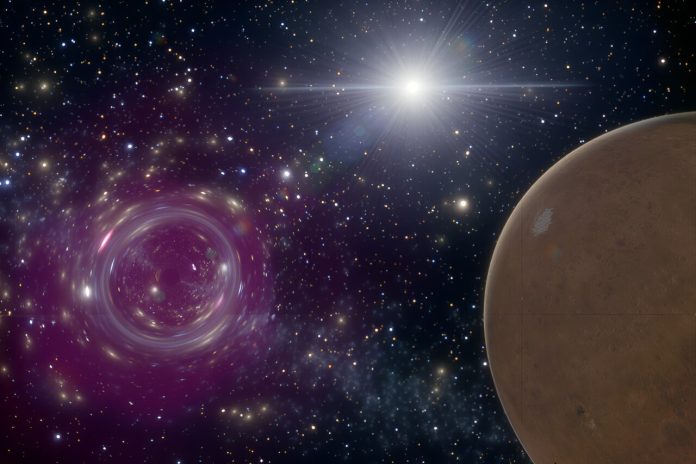
In a fascinating new study, physicists from MIT propose that a small wobble in Mars’ orbit might help solve one of the biggest mysteries in the universe: the nature of dark matter.
Dark matter is an invisible substance that makes up most of the matter in the universe, but scientists still don’t know exactly what it is.
The researchers suggest that if dark matter is made up of tiny black holes—an idea first thought of in the 1970s—these black holes could occasionally pass through our solar system.
When they do, their gravity might cause Mars to wobble slightly in its orbit, a movement so small that it would only be detectable with today’s advanced technology.
Detecting such a wobble could provide evidence that these tiny black holes, known as primordial black holes, are responsible for the dark matter in the universe.
This idea is both exciting and challenging for scientists, as it could change the way we think about dark matter.
A closer look at dark matter
Only about 20% of the matter in the universe is visible. The rest is dark matter, which we can’t see directly but know exists because of its gravitational effects on stars and galaxies.
For years, scientists have been trying to detect dark matter on Earth by searching for particles that might scatter and create signals in experiments. However, these searches haven’t found anything definitive yet.
An alternative idea is that dark matter isn’t made of particles at all but rather consists of microscopic black holes that formed shortly after the Big Bang, the event that created the universe.
These primordial black holes would be much smaller than the black holes formed from collapsing stars and would have spread throughout the universe as it expanded.
Can a black hole make Mars wobble?
The MIT team became curious about what would happen if one of these tiny black holes passed close to a larger object, like a planet. They wondered if the black hole’s gravity could cause a noticeable effect, like a wobble in the planet’s orbit.
To explore this, they created a computer simulation of the solar system, including the orbits of all the planets and some of the largest moons.
The simulation showed that if a primordial black hole passed near Mars, it could indeed cause a small wobble in the planet’s orbit—a shift of about one meter. While this might sound tiny, it’s significant enough that the instruments currently monitoring Mars could detect it.
How likely is a black hole flyby?
The researchers estimate that a primordial black hole could pass through our solar system about once every 10 years. These black holes would be extremely fast, moving at about 150 miles per second. If one passed close enough to Mars, it could cause the planet’s orbit to change slightly.
However, detecting such a wobble would be tricky. Scientists would need to rule out other possible causes, such as asteroids or other space debris, which also could affect Mars’ orbit. Fortunately, astronomers have been tracking space rocks for decades, so they have a good idea of how these objects move.
The MIT team is now working with other scientists who specialize in detailed simulations of the solar system. They want to include more objects in their simulations, such as smaller moons and asteroids, to see how these might interact with a passing black hole. By doing this, they hope to better understand how a black hole flyby might differ from the effects of other objects in space.
While this study is just the beginning, it opens up a new and exciting way to search for dark matter. If scientists can detect a wobble in Mars’ orbit and link it to a passing black hole, it could be a major breakthrough in understanding the universe’s dark side.
As one physicist not involved in the study pointed out, there’s an element of luck involved in finding such a signal. But with the tools and knowledge scientists have today, they are closer than ever to uncovering the secrets of dark matter.
Source: MIT.



